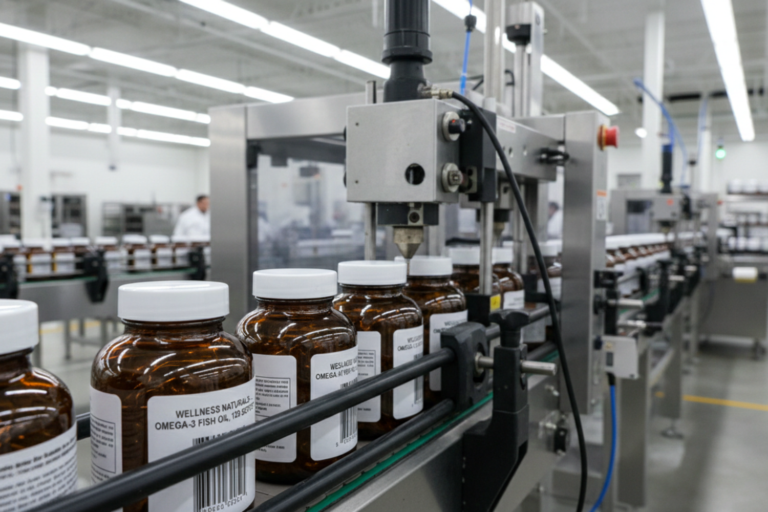Choosing the right supplement manufacturer is one of the most critical decisions entrepreneurs make when starting or scaling a supplement business. In the fast-moving dietary supplement industry, one mistake in selecting a manufacturing partner can lead to poor product quality, regulatory issues, and long-term damage to your brand. This guide highlights 15 common and costly mistakes when choosing a supplement manufacturer and offers practical strategies to avoid them.
You’ll learn how to identify reputable supplement manufacturers, ensure regulatory compliance, verify quality control standards, and select a private-label supplement manufacturer aligned with your target market. By the end, you’ll be equipped to make informed decisions that support your brand’s long-term success in the competitive supplement market.

15 Mistakes to Avoid When Choosing a Supplement Manufacturer
Starting or growing a supplement brand means making wise decisions early—especially when choosing your manufacturing partner. Avoiding these common mistakes can protect your investment, support product quality, and help your business succeed in the dietary supplement industry.
1. Picking the Cheapest Option Without Looking at Value
Choosing the lowest-cost manufacturer may seem like a smart way to save money, but it can lead to bigger problems later. Low prices often mean shortcuts in quality control, poor quality raw materials, or unreliable service.
Instead of focusing only on price, compare what supplement manufacturers offer regarding quality certifications, production capabilities, and customer support. A good manufacturing partner will help you scale production, ensure quality, and support your business’s growth—saving you more in the long run.
2. Not Verifying Certifications and Compliance Standards
Working with a supplement manufacturing partner lacking proper certifications can risk your brand. Reputable supplement manufacturers follow strict quality control standards and stay up to date with regulatory requirements. If a company avoids showing proof of certifications, that’s a red flag they may be compromising quality.
Look for these key certifications:
- cGMP (Current Good Manufacturing Practices): Shows the manufacturer follows high standards in the supplement manufacturing process.
- FDA-Registered Facility: Indicates the facility is registered with the FDA and subject to inspection, which is a basic requirement for compliance in the dietary supplement industry.
- NSF Certification: Confirms third-party inspection and testing for quality and safety.
- ISO Certifications: While not required, ISO certifications may indicate that the manufacturer follows standardized processes for quality management.

3. Skipping Product or Batch Testing
Not all supplement manufacturers test their products thoroughly, which can lead to quality issues, inaccurate supplement formulations, or even product recalls. Batch testing helps verify that products match label claims and are produced according to quality control standards.
Always ask if they perform third-party testing and request copies of their testing protocols. This step is key to producing high-quality supplements and maintaining customer satisfaction.
4. Ignoring Raw Material Quality and Sourcing
High-quality raw materials are essential for consistent formulation and product quality. Using low-grade or poorly sourced ingredients can hurt your supplement brand’s reputation and reduce product effectiveness. It’s important to ask where raw materials are sourced, how they’re tested, and whether suppliers meet quality control benchmarks. A reputable private label manufacturer will be transparent about ingredient sourcing and offer documentation to ensure quality.
5. Overcomplicating Your Supplement Formula Early On
Trying to create a complex supplement formula at the start can slow down production, raise costs, and lead to inconsistent results. New brands benefit from starting with simpler supplement formulations that are easier to manufacture and scale.
A clean formula using high-quality raw materials often supports better consistency and consumer trust and allows you to meet consumer demand without overextending resources. Keep innovation balanced with practicality so your supplement business can grow without delays or quality issues.
6. Not Asking for Samples or Test Runs
A trustworthy supplement manufacturing partner will offer product samples or small test runs before full production begins. Samples help you evaluate taste, texture, and packaging, giving you a real look at product quality.
Don’t rely on sales claims—use samples to check if the manufacturer can deliver on your needs. This step is vital for testing your product with your target audience before investing in large quantities.
7. Choosing a Manufacturer With No Experience in Your Product Type
Not every manufacturer has experience with all supplement forms. Picking a contract manufacturer that lacks experience with your product type can lead to poor results and wasted resources. The proper supplement manufacturer should have a proven track record with your specific format.
Key supplement types to confirm expertise in:
- Gummies: Requires specialized equipment and ingredient handling.
- Powders: Needs precision for mixing and flavoring consistency.
- Capsules: Involves accurate dosing and encapsulation methods.
- Liquids: Must follow strict sanitation and shelf stability procedures.
Working with a private-label supplement manufacturer who understands your format can help avoid delays, errors, and product recalls.
8. Ignoring the Facility’s Cleanliness and Sanitation Practices
A clean and sanitary facility is critical to producing high-quality supplements that meet safety standards. Poor sanitation can lead to contamination, failed inspections, or damaging your brand’s reputation. Ask for a virtual or in-person tour of the manufacturing facility.
Pay attention to how raw materials are stored, how cleanrooms are managed, and whether the space follows good manufacturing practices. Clean facilities are a clear sign of commitment to supplement safety and customer satisfaction.

9. Forgetting to Review Their Production Workflow and Timeline
Understanding the supplement manufacturing process helps avoid delays and surprises. A reputable supplement manufacturer should clearly explain how long each production stage takes and what happens if issues arise.
Ask about average lead times, capacity limits, and how they handle changes in order volume. Transparent production workflows help you plan marketing strategies and product launches around real timelines, which is key for staying ahead in a dynamic market.
10. Not Planning for Scalability or Flexibility
Many entrepreneurs forget to ask if a supplement manufacturer can handle increased order volume as their business grows. If a manufacturer can’t scale production or adjust to shifting market demand, you risk delays, stockouts, or missed sales.
Look for a supplement manufacturing partner with flexible production options, enough capacity, and the systems in place to grow alongside your supplement brand. A scalable partner supports your brand’s long-term success in a fast-moving supplement market.
11. Overlooking Labeling and Packaging Compliance
Labeling mistakes can lead to regulatory penalties or customer mistrust. Packaging in the dietary supplement industry must meet FDA guidelines, avoid unapproved health claims that could trigger regulatory issues, and follow all labeling rules. A reputable private label manufacturer will help you take proper labeling steps and review your marketing materials to avoid such claims that can cause legal problems. The right partner should support compliance from the start, helping you stay aligned with regulatory requirements while building consumer trust.
12. Partnering With a Manufacturer That Lacks Innovation or R&D
The supplement industry changes fast, and staying competitive means adapting to consumer trends with new products. A good manufacturing partner offers research and development support, custom formulations, and tailored solutions to help your product line evolve.
Without innovation, your brand can fall behind market demand. Look for manufacturers who invest in scientific research, ingredient sourcing improvements, and updated manufacturing processes that support product quality and brand growth.

13. Not Reading the Fine Print in the Manufacturing Contract
Overlooking contract details can lead to unexpected costs or loss of control over your products. Every agreement with a supplement manufacturing company should clearly outline responsibilities, expectations, and terms.
Key contract terms to clarify include:
- Minimum Order Quantities (MOQs): Know how much product you must order.
- Exclusivity Clauses: Understand if your formula or label will be shared with others.
- Intellectual Property (IP) Rights: Ensure your brand owns its formulas and designs.
- Lead Times and Delivery Terms: Confirm how delays are handled.
- Termination Clauses: Know how to exit the agreement if needed.
A well-structured contract protects your supplement business and helps ensure quality and customer satisfaction.
14. Failing to Ask for Past Client Results or Case Studies
Seeing real examples of a manufacturer’s past work is one of the best ways to judge their reliability. Reputable supplement manufacturers should have case studies or client testimonials that show how they’ve helped other businesses grow. These success stories reveal the manufacturer’s ability to meet deadlines, produce high-quality supplements, and support private-label brands in reaching their target market. Ask for proof—not just promises.
15. Choosing a Partner With Poor Communication or Support
Strong communication is essential for a smooth manufacturing process. Poor customer support or slow response times can lead to missed deadlines, confusion, and costly mistakes. A reliable supplement manufacturing partner will offer fast, clear answers and be proactive when issues arise.
You should feel confident they understand your goals and are available when needed. Good communication is just as important as good manufacturing practices when building a successful supplement brand.
How to Avoid These Mistakes and Choose the Right Manufacturer
Avoiding common mistakes in supplement manufacturing starts with a clear plan and thorough research. Entrepreneurs should take time to evaluate each potential partner, focusing on quality standards, regulatory compliance, and long-term business support. The right supplement manufacturing partner will align with your target audience, support private label goals, and deliver high-quality supplements that meet market demand.
Follow these steps to choose the right manufacturing company:
- Build a checklist based on the key factors above, including certifications, production capabilities, and communication practices.
- Before committing to one, vet multiple candidates to compare quality, customer support, and proven track records.
- Start small with a limited production run and scale production once the manufacturer proves reliable.
Set Your Brand Up for Success by Choosing the Right Supplement Manufacturer
Choosing the right supplement manufacturer significantly affects a brand’s success in the dietary supplement industry. A strong manufacturing partner helps maintain product quality, supports regulatory compliance, and offers flexibility to grow your product line over time.
Smart decisions at this stage lead to fewer risks, better customer satisfaction, and a stronger presence in the supplement market. Researching and comparing supplement manufacturers helps ensure your supplement business is built on a solid foundation. For help getting started, consider downloading our free checklist to guide your search for a reputable manufacturer.
Frequently Asked Questions
What certifications should a supplement manufacturer have?
Look for cGMP compliance, FDA registration, and third-party certifications like NSF to ensure product safety and regulatory compliance.
Why is batch testing important in supplement manufacturing?
Batch testing confirms that each product meets label claims and quality standards, helping to avoid product recalls and ensure supplement safety.
How do I evaluate a manufacturer’s raw material quality?
Ask about ingredient sourcing, testing protocols, and documentation to verify the use of high-quality raw materials in your supplements.
What should I ask when getting supplement manufacturer samples?
Check for product consistency, flavor, packaging, and quality benchmarks that reflect what customers will receive.
How can I tell if a supplement manufacturer is scalable?
Review their production capacity, lead times, and flexibility to handle increasing order volumes as your supplement business grows.
References
- Code of Federal Regulations. (2025). 21 CFR Part 111—Current good manufacturing practice in manufacturing, packaging, labeling, or holding operations for dietary supplements. https://www.ecfr.gov/current/title-21/chapter-I/subchapter-B/part-111
- U.S. Food and Drug Administration. (2025). Current Good Manufacturing Practice (CGMP) Regulations. https://www.fda.gov/drugs/pharmaceutical-quality-resources/current-good-manufacturing-practice-cgmp-regulations
- U.S. Food and Drug Administration. (2024). Dietary Supplements. https://www.fda.gov/food/dietary-supplements
- U.S. Food and Drug Administration. (2024). Questions and Answers on Dietary Supplements. https://www.fda.gov/food/information-consumers-using-dietary-supplements/questions-and-answers-dietary-supplements



